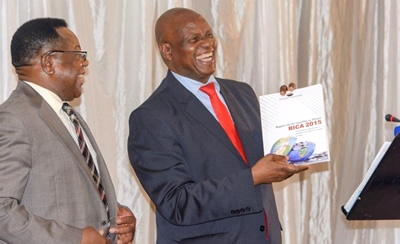
‘Given the diminishing levels of overseas development assistance to Africa, successful implementation of Africa’s development agenda will reply more on mobilizing domestic resources. However, building capacity for domestic resource mobilization is not merely about increasing tax revenues and generating savings from domestic resources, but also encompasses promoting good governance, inclusiveness and social justice,’ says the 2015 African Capacity Report, whose theme is “Capacity Imperatives for Domestic Resource Mobilization” (DRM).
The Report, which was launched on 7 December in Harare by the African Capacity Building Foundation (ACBF), with simultaneous launches in Nairobi and Geneva, encourages African governments to pay particular attention to developing the capacity needed to improve DRM, enhance its legitimacy in the eyes of the public and manage the complex processes and interactions in the political-economy nexus in order to achieve sustainable economic growth and poverty reduction.
African countries have been able to increasingly mobilize domestic resources, with the resources mobilized reaching a record US$508.3bn in 2013 while remittances from the African diaspora reached $61bn the same year. However, the 2015 ACR says that there is still room to improve DRM as “tax performance still leaves much to be desired, tax systems are still inefficient and costly, and significant amounts of revenue are lost as a result of tax exemptions and tax avoidance”. And large estimates of illicit financial flows (IFF) continue to deprive Africa of its scarce resources. Notably, the capacity gaps to effectively generate savings and taxes from domestic resources and effectively allocate them to economically and socially productive activities, remain glaring.
According to the Report, the majority of surveyed countries expressed high needs for capacity building in four key areas, namely: revenue collection; financial sector strengthening; fighting corruption, and; curbing illicit financial flows.
The Report recommends that African countries, in addition to simplifying and rationalizing tax systems (closing of tax loopholes, reducing tax exemptions, and dealing with corruption within tax administrations), invest in the capacity of revenue authorities as part of a broader fiscal reform agenda.
The ACR 2015 also underlines the importance to ensure that revenue authorities have the capacity to engage with taxpayers to foster a culture whereby taxpayers are aware of their rights and obligations, and that they can understand that their taxes will be used for building state or local capacity for better service delivery. Efforts at improving DRM can be effective and sustainable if the citizenry is assured that the domestic resources mobilized will be used towards development sectors that are largely inclusive of the wider population.
The Report stresses the importance of building capacity to raise revenue from neglected sources such as the taxation of small informal businesses/activities and such neglected areas as property taxes. In the case of property taxes, this implies that ownership records have to be updated, cadastral surveys done and systems deployed to ensure that property values are frequently revised.
In efforts to build capacity for domestic resource mobilization, African countries should not underestimate the role of donors especially in in building efficient tax collection systems, as seen by successful experiences in countries such as Rwanda and Ghana. Doing so could take the form of training tax administration staff, providing the IT infrastructure, investing in data collection, and helping to set up tax registrie
On IFF, the Report highlights that investments are much needed in the areas of human, technical, legal and regulatory, and financial capacities to deal with IFFs at the country level, in addition to cooperation at the regional and global levels. “By their very nature, IFFs are difficult to track due to lack of information, and tackling illicit flows at the local level requires cooperation and sharing of information among various agencies,” the Report adds. “Skilled government officials with the technical and legal expertise to track and prosecute those who engage in illicit activities are often lacking, and this problem is compounded by poor legal frameworks and political interference.”
The ACR 2015 also points out that African countries should do more to attract investment from the African diaspora by providing, for instance, better financial services, which would encourage increased remittances through formal channels. Tackling the remittances market would come with advantages for African countries. “The benefits of remittance flows compared to other external flows such as Foreign Direct Investment or Official Development Assistance are well known. They are less volatile, and unlike ODA they do not have conditions attached to them,” the Report says.
The Report also highlights that more investments are required in areas of financial inclusion and product innovation in the financial sector.
The message the ACR 2015 is making is clear: successful implementation of Africa’s development agenda will reply more on mobilizing domestic resources. However, the capacity gaps to effectively generate savings and taxes from domestic resources and effectively allocate them to economically and socially productive activities, remain glaring. This calls for Governments, private sector, civil society and donors to rally around efforts at building this capacity.
The ACR 2015 will be launched in Accra, Ghana on 17 December, 2015.
Download your copy | ACR overview





